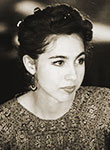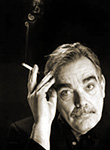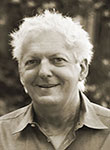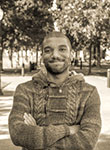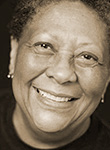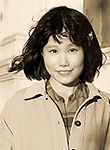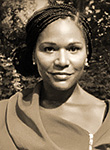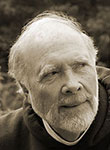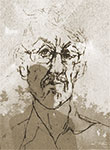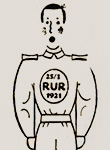This fall marks Blackbird’s twenty-first Levis Remembered, which highlights the work of Larry Levis and recognizes Devon Walker-Figueroa, winner of the twenty-fifth annual Levis Reading Prize.
Representing Levis in this issue are the poem, “Elegy for Poe with the Music of a Carnival Inside It,” portraits of Levis, and an essay locating the piece as “A Haunted Poem in a Haunted City.”
In the essay, Gregory Donovan limns the connection between Levis and Edgar Allan Poe through their shared location of Richmond. Donovan leads readers through Levis’s experience of Richmond as Levis leads us through Poe’s. Donovan writes that “Levis imagines an invisible, ghostly city that exists right alongside or within the one that is the present-day city described in its lines.” Also appearing here are images by David Freed memorializing Levis in portraits that illustrate Freed’s sensed connection between poetry and visual art.
Walker-Figueroa’s prize-winning book, Philomath, a poignant collection that ruminates on the speaker’s upbringing in rural Oregon, investigates the role of place in the formation of the self, and how one’s home continues to inform adult experience. In “The Blood’s Unwritable Psalm,” Walker-Figueroa writes: “My body is just the story it tells / in order to be true.” Walker-Figueroa is represented by four poems republished from her winning collection. Three new poems, as well as a review of the book by Katy Scarlett, accompany the work.
Brian Brodeur’s poems question the stability of perception and selfhood, and his speakers encounter worlds wherein “The dream dissolves” and “There is no thing itself.” These poems avoid asserting the unreality of everything and deftly parse what makes meaning become a reality to the mind. In “Playing Dead,” Brodeur writes “You’ll swear you’re not dead, too, but even those / who hear you won’t believe the cries you make / mean much.” Existence and cognition are complicated by self-perception’s intertwinement with the perception of the always present other. An interview with Brodeur appears in Features.
New poems by Jehanne Dubrow explore the effect of vacant and violent environments on individual and social psychologies—the way war permeates life in the present and persists in memory as an unending present for years that follow. Dubrow’s speaker in “Foreign Affairs” says “But who were we to explode our nights / with small concerns?” Perpetual threat becomes a theft of small moments, and the quiet thoughts that should be able to occupy passive experience are replaced by exhaustive fear. The speaker continues: “We slept on our backs. Our limbs / like deadened things,” highlighting the way wartime violates the body indirectly.
Three poems by T.R. Hummer attempt to reconcile the divide between quotidian human experience, the resonances of history that haunt them, and the divine that persists in both. In “Persistent Illusions,” the speaker questions God: “If winter brings out the worst in us, it’s your own / Numinous fault. I’m reasoning like a human, / But that’s all I am.” The speaker investigates what it is to participate in the grievances and joys of life from a distinctly human perspective.
With an expansive and transformative approach to his chosen point of reference, Edward Mayes, in his poem “On Lines from Czesław Miłosz’s ‘Meaning,’” dissects Miłosz’s work line by line—presenting, for each one, a complex exploration of human behaviors and the often cyclical and powerless nature of life. Through the clever employment of cultural references and non-English phrases alongside striking imagery, Mayes emphasizes the universality and inherent humanity of these moments with an expert balance of nihilism and hope. “Still alive, holding on? You counted then recounted / And still numbers refuse to add up to / Anything you would care to praise.”
“We’d never make it that far,” Dustin Pearson writes in his poem “Time Spent,” a probing meditation on the transience of friendship and the confusing identities created for us by those we are closest to, if only for a brief time. Pearson grapples with the surface level, the marginal, and the insatiable, which he can only seem to describe by means of their absence. “I think,” he writes in “Platonic Love” that “I can quantify love / at every place / it’s not shown.”
Catherine Pierce’s poems exist in a stasis of anticipation on the precipice of a reality that cannot confirm itself, explored through images that are “cast forever in the moment / before the moment that follows.” These poems are held in the liminal space where daily life meets the apocalyptic, and the speaker’s desire for safety and understanding within both. In “The Whywolf,” Pierce writes, “The whywolf is pretty sure that enough / understanding will render the wild world safe.”
Aleš Šteger’s poem “Human,” translated by Brian Henry from Slovene, philosophizes about humanity—the duplicity of what a human is and is not, and the coexistence of multiple meanings. Šteger casts the human as a letter, as a shadow, and as a self. “I heard a human / Praying with a word. / I saw how / A human killed a human / With a word.” Ultimately, being is a state of continuous making, whether through physical action, metaphor, or language.
In his poems, C. Dale Young investigates the speakers’ relationship with the self and the self as seen by the other through art, reflection, and external perception. At times the self is a portrait; at others, a harbinger of death. In “Self-Portrait Without a Mirror,” Young writes &8220;It reached a point where I no longer needed / a mirror. I was tired of looking at myself, and I / already knew all of the flaws.” For the speaker, the self is not just the body but the psyche and its search for meaning.
“They say men never help . . . Today I helped. Why shouldn’t I be thanked?” states the husband in “Don’t Mention It,” a precise narrative where Amina Gautier considers gender roles in marriage and parenthood in a contemporary, dual-income home. In an exploration of imbalanced expectations, Gautier gives readers a snapshot of a couple’s relationship caught in suspended tension after the husband has requested thanks from his wife for the act of braiding their daughter’s hair—something his wife does daily with no recognition. Deciding to teach her husband a lesson, the wife shows him a life wherein she does not do the things for which she has, in the past, received no thanks.
In a contemplation of formative childhood experiences, Jiyun Liu’s “Cruelty” confronts the gray areas of care and fairness with the markedly well-intentioned cruelties of a mother toward her daughter. Liu captures the frustration and misunderstanding of adolescence through Chi-wen, a young girl taking English lessons at her mother’s insistence. As Chi-wen is being escorted to her lessons by her mother, the two witness the aftermath of a tragedy that affects not only Chi-wen’s night but informs her future as well. Liu interrogates the lasting impact that core childhood experiences have on an individual’s life, even as it and the world around them continue to alter.
In a contemplation of anonymity and honesty, Jill McCorkle’s “Confessional” poses a scenario in which a couple purchases a mysterious, antique confessional booth, drawn to a saleswoman’s enigmatic stories of its past. What begins as a lighthearted game quickly becomes intrinsic to their interactions and frames their relationship. The faux anonymity of the confessional allows for an honesty that did not previously exist between the two because “all that is confessed stays inside the box.” Each feels the compulsion to reveal long-kept secrets hidden beneath their relationship—from bystander’s guilt, to cheating, to the drugging of a family member—despite inevitable emotional consequences.
Jamila Minnicks’s short story, “To Have, To Hold,” delves into themes of love, societal pressures, and revenge. Minnicks moves between past and present, unraveling a series of events that lead to her opening scene, as well as to the events that follow. Lena’s mother urges her to settle down, marry her soon to be fiancé, and get rid of her motorcycle—an extension of Lena’s own freedom. Lena’s journey is reflected in sensory detail: “ . . . the scent on his exhale, and from his jacket, warmed past my lips, swirled around in my mouth, and eased its way down my throat to settle, heavy, inside my chest.”
Marilyn Nelson concludes her translation from the Danish of Inge Pedersen’s novel The path leads through the air, with its eighth and final installment, “Breathing Technique.” Pedersen’s novel culminates here with the narrator’s search for closure and stability. The narrator finds herself alone, swimming in an imagined foreign country, attempting to understand how to navigate the unfamiliar in isolation. A mini-interview with Nelson appears in Features.
In Bill U’Ren’s “Almond Sweaterhead,” readers are captured in an idyllic, coastal Maryland town through the eyes of teenaged Alma. The mundane daily machinations of this town are interrupted in a moment by the death of a longtime resident and the near-simultaneous arrival of teenaged Opal, who begins work with Alma. Opal’s arrival compels Alma to examine the stability of her life with newfound appreciation, realizing “that her own normal day-to-day life, which maybe she hadn’t ever thought about one way or the other, had a certain attraction to it that she hadn’t really recognized.”
Hal Crowther begins his essay “The Forever Queen: Good-bye to All That” as an earnest homage to the late Queen Elizabeth II. Moving beyond the initial shock following her death that was felt globally, Crowther explores what it means when a “psychological landscape” becomes “profoundly rearranged” and urges us to consider how we move on from here. He brings to our attention the dangers of idolatry with thought-provoking nuance while upholding his respect, admiration, and empathy for the Queen, who “was an ordinary woman, by most accounts, who found herself in an extraordinary situation and exceeded all expectations.”
The ninth and final installment from Wesley Gibson’s You Are Here: A Memoir of Arrival appears in Nonfiction. In preparation for his roommate, John’s, inevitable demise and the subsequent eventual loss of his apartment, Gibson searches for a new living space while simultaneously attempting to navigate a tense and uncomfortable relationship with John’s family as John deteriorates. With pointed humor, Gibson further investigates human relationships, and the trial of surviving as a gay man amidst the AIDS crisis.
Dara T. Mathis’ piercing essay about the cumulative loss of her hearing during the 2020 pandemic wrestles with feelings of inadequacy brought about in both her personal and professional life as a result of her “unhearing.” She writes of her attempts to push off her condition’s severity for the sake of her children, saying that “I could not handle the thought of my kids seeing me as deficient, broken, incapable of giving them what they needed. The way I saw myself.” As she journeys through this hearing loss, a newly diagnosed generalized anxiety disorder, and the upheavals of the pandemic, she rediscovers her own resiliency and the importance of making yourself heard.
At a little more than the century mark, Karel Čapek’s 1920 Czech play, R.U.R. (Rossum’s Universal Robots) is reprinted here in Gallery along with supplemental materials including images of cover designs, notes on variant English editions, and reviews of the play’s 1922 New York debut in English. Karel Čapek’s brother Josef suggested the Czech word robati to represent the organic, but mass produced, artifical laborers in the play. The word, and the centrality of robots in endless variety, lives on in the world's imaginative storytelling, and in our daily lives.
Colin Bailes reviews a new collection of poems by Jay Hopler, and Danielle Kotrla, Rebecca Poynor, and Waverley Vesely provide mini-reviews of work by Robert Wood Lynn, Sara Eliza Johnson, and Bruce Bond.
A mini-interview with Leslie Adrienne Miller by Hayley Graffunder completes the issue. ![]()
Return to top menus | Browse issue
